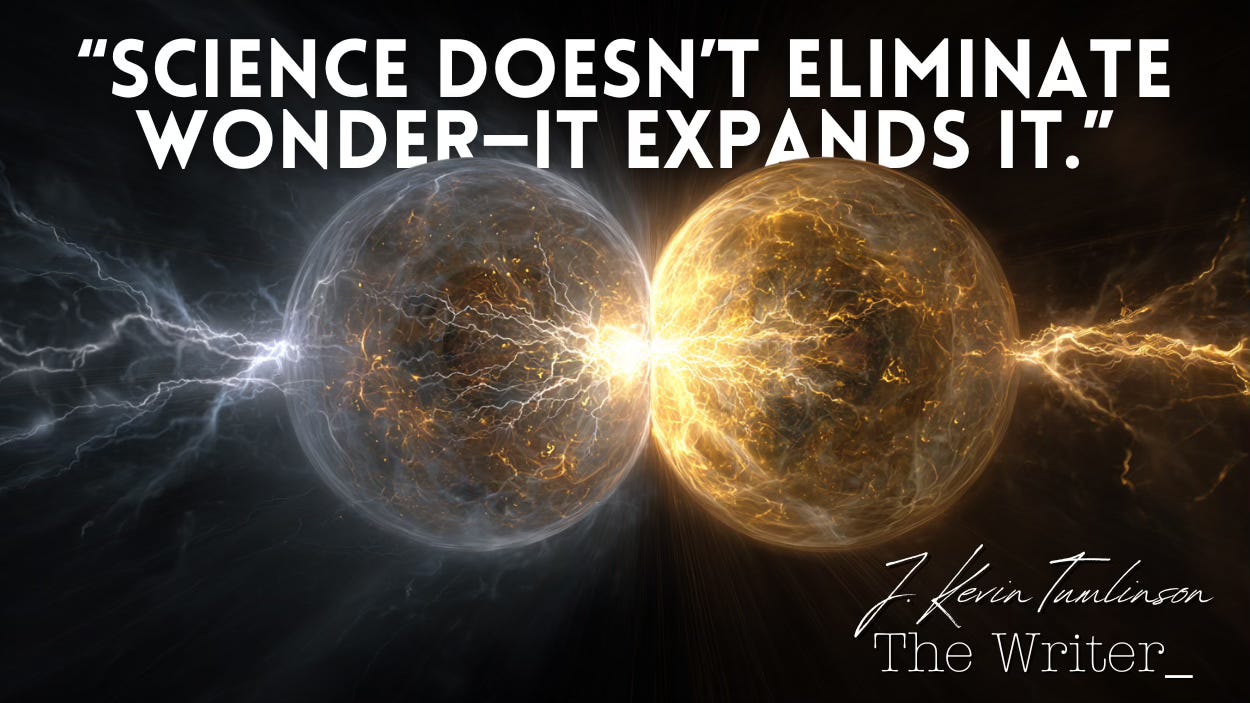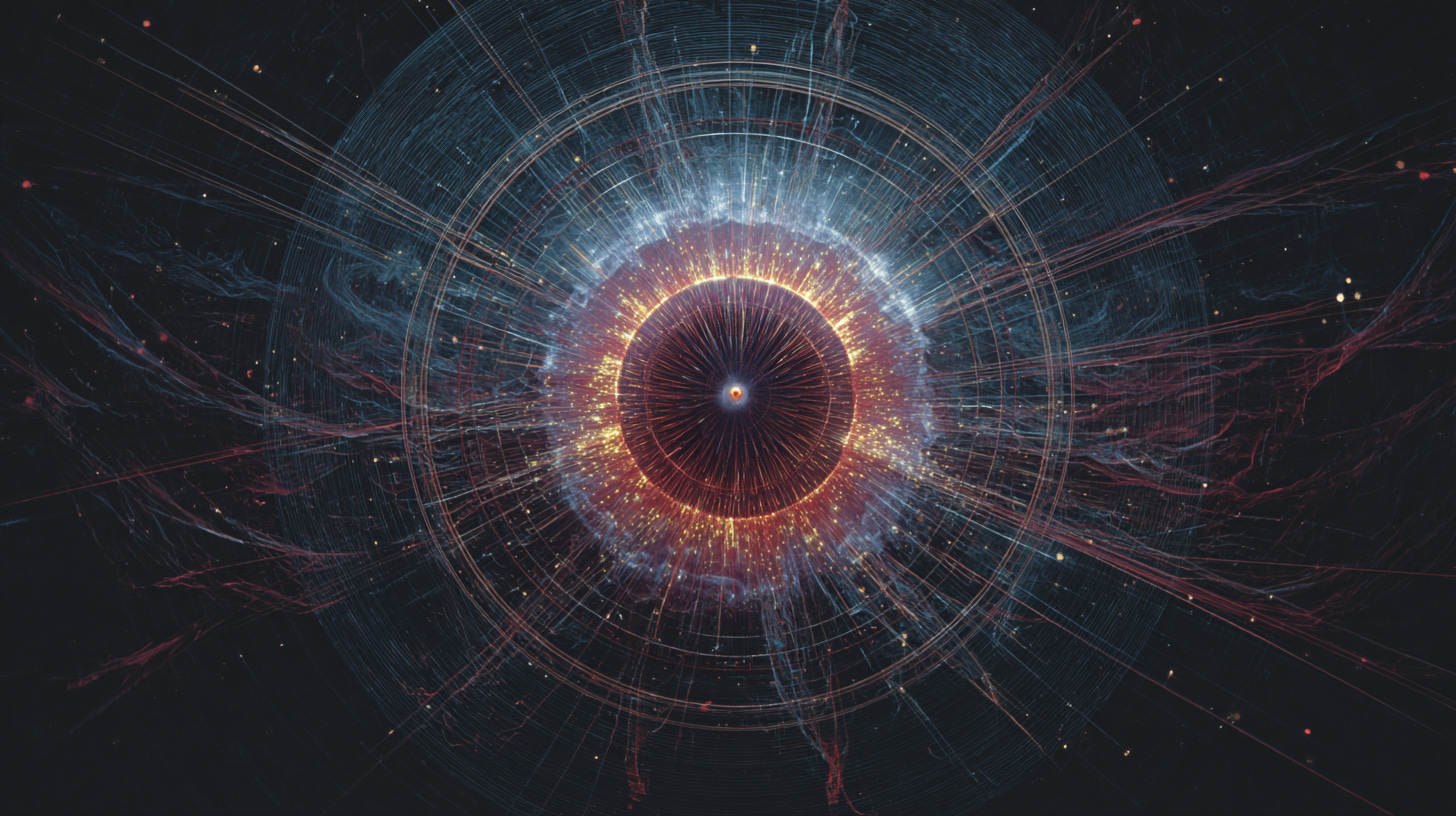The God Particle and the Myths That Saw It Coming
Why the Higgs boson feels familiar to every culture’s creation story
BEFORE WE START—I want to give a shout out to my new friend and fellow writer, Samuel George London. He’s currently writing a novel on Substack, a chapter at a time, and it’s a fun and thrilling read. Alpha Guard, billed as “Jack Reacher in space,” has punch and excitement. I can’t wait to see how it evolves. Please pop over to Sam’s Substack, subscribe and read along!
In 2012, scientists at CERN announced the discovery of the Higgs boson, a particle that had been theorized and predicted but never directly observed. The headlines dubbed it “the God Particle,” a name that stuck even though most physicists hated it. The term came from Leon Lederman’s book The God Particle, and it was meant more for marketing than theology. Still, the phrase hit a nerve, and I think for good reason.
Because whether we call it divine or not, the Higgs boson feels mythic.
In the 1960s, several physicists—most famously Peter Higgs, along with François Englert and Robert Brout—proposed that there must be an invisible field pervading the universe that gives particles their mass. Without it, everything would behave like photons, zipping around weightless and never clumping into stars, planets, or people. For decades the Higgs boson itself was a ghost: predicted by the mathematics but unobserved in reality. It wasn’t until the construction of the Large Hadron Collider at CERN, a 17-mile underground ring built to smash protons together at near light speed, that scientists finally had the tools to glimpse it. In 2012, after years of painstaking experiments, the Higgs boson appeared in the data—confirming the theory and earning a Nobel Prize for Higgs and Englert.
That’s the technical history. It’s amazing enough on its own. But there’s something more to the Higgs boson. Something that tugs at a deeper part of our cultural memory.
It’s the particle that gives mass to everything in the universe. Without it, matter wouldn’t coalesce into stars or planets, skyscrapers or city streets, rainforests or trees or flowers.
Or people.
We wouldn’t be here to ask questions or to dig deeper, to theorize about the existence of a world beyond our own and then, miracle of miracles, go off and prove it exists.
In a very real sense, the Higgs field is the hidden fabric that binds the cosmos together.
And that language—“hidden fabric,” “binding force”—ought to spark a sense of déjà vu, especially for readers of my work.
Ancient myths are filled with invisible forces that shape reality. In other words, we’ve heard stuff like this before.
In Egypt, the god Ma’at represented balance and order, the principle that kept the world from dissolving into chaos. In Greece, the Logos was the rational structure of the universe, a divine reason woven through all things. In Hindu tradition, Brahman is the unseen essence behind the changing world. Even in biblical scripture, Christ spoke of the kingdom of God as being somehow small but large, and woven through all of reality—like yeast worked through dough, it’s everywhere all at once. A unifying field underlying all of creation.
Different cultures. Different vocabularies. But the same intuition—that something unseen sustains existence.
Now physics tells us that the Higgs field permeates the universe, just like that yeast in the dough. A core particle that gives matter all the qualities that make it matter. How interesting is that?
A mythmaker might describe it as the breath of the gods. A scientist describes it as a scalar field with nonzero vacuum expectation value. Which, itself, takes a lot of breath just to say. Regardless, what we have is two ways of describing the same thing. The Higgs boson—the God Particle—is that essential something that makes the universe the universe. Without it, the universe doesn’t exist as we know it.
What fascinates me isn’t whether the ancients somehow “knew” about the Higgs boson. It’s that human beings, across millennia, have sensed that the visible and tangible world rests on something invisible and intangible. And before we had particle accelerators or atomic models or even just microscopes, we had a grasp of an idea. That something was there, at the foundation of it all, telling it all how to be.
Myth and physics, it turns out, are partners in the same story. One uses poetry, the other uses equations. Both are reaching toward the mystery.
Maybe that’s why the nickname “God Particle” won’t go away. It’s a reminder that science doesn’t eliminate wonder—just expands it. The more we discover, the more we realize we’re part of a universe that is deeper, stranger, and more connected than we imagined.
As a novelist, I can’t resist the metaphor: every story has a hidden structure, an unseen force that gives the characters weight and makes the plot coherent. Without it, the words would just scatter like dust. Meaningless scratches on the page.
The Higgs boson is to matter what story is to humanity—a field that binds us, that gives meaning to the chaos.
SPEAKING OF STORIES. . .
I write a lot of them. And most are available as novels and novellas, available from my website at https://kevintumlinson.com/books. I hope you’ll go find one that becomes your new favorite story.
A NOTE AT THE END
Two days ago, a very disturbed and mentally sick young man named Tyler Robinson murdered a very good, Christ-following man named Charlie Kirk, for nothing more threatening than speaking truth as he knew it.
I liked Charlie. I know that’s going to mark me in some way, among some readers. But I did. I liked that he stood for certain values—“God, family, and country, in that order.” As a conservative, I agreed with most of his viewpoint, if not all. What I agreed with in particular is his desire to talk about it. Public discourse on the things we disagree over is the only way we grow.
I’ve seen a lot of vile things since Charlie was murdered. It makes me angry. Makes me sick, but really, more than anything, makes me angry.
Following right on the heels of that assassination was the anniversary of 9/11. Another day I remember clearly. I was a high school teacher when that happened. I taught “the bad kids,” on an alternative campus. A place meant to be punishment for young people who got caught fighting or using drugs, or in some ridiculous cases, having something like an unopened blister pack containing a pocket knife, locked in the glove box of the recently retired father’s pickup truck.
Yeah, I’m still pissed about that, more than two decades later.
Anyway, on 9/11 my class full of “bad kids” and I watched events unfold with the twin towers, thousands of miles from my classroom. And I had to answer questions like, “This is happening all the way in New York, why should we care?” Or “does this mean we’re at war? Are they going to bomb us?” But the questions that haunt me most, even now, are things like, “were there any kids on the airplanes? Who is taking care of the babies? Why do those people hate us?”
I didn’t have answers then, for any of those questions. And I’m too broken about it all to go find them now. I don’t want to know.
Why do people turn to violence in response to ideas they don’t like?
I can’t say. I can speculate.
When your identity is so thoroughly wrapped up in an idea, and someone challenges that idea so profoundly that you can’t help but notice its flaws and weaknesses, you feel that like an attack. Your ego, the clinging child of your unconscious mind, doesn’t know the difference between words that hurt and attacks that might kill. And so it responds the same way to both. It attacks back, thinking it’s saving your life.
Tyler Robinson heard the legacy media and his friends call Charlie Kirk a fascist and a “literal Nazi” so often, and heard so many lies about things Charlie supposedly said, and was so offended by all of those things, he felt it as a legitimate threat. He felt wounded by it. And so he decided to fight back. Kill Charlie before Charlie could kill him.
The same was true on 9/11. A group of people believed their own philosophy so deeply that anything that contradicted it was an attack—too dangerous to ignore. Their very lives were threatened. That’s what they believed.
No logic, no debate, no argument would persuade them otherwise.
The danger of hinging your identity on something external, so deeply that a contradiction to it feels like a violent attack on who and what you are, is that you are rendered incapable of stopping and reflecting and considering that maybe there’s a point there. Or, at the very least, maybe their words don’t matter.
You can hear an opinion that starkly contradicts your beliefs, and live to continue in those beliefs anyway.
I’m heartbroken by what happened to Charlie Kirk. Not especially because his life has ended, though I think that’s a true tragedy. I’m broken because a bullet not only ended Charlie’s life, it shattered the lives of his wife and their two children, his parents and extended family, his team and co-workers, his community, and on and on and on. One bullet. Massive ripples. And now, a wound and a cry for vengeance, if not justice.
It breaks my heart, because I’m seeing masses of vile people celebrating Charlie’s death. And that makes me remember seeing footage of people cheering in the streets and burning US flags, after 9/11. It reminds me that there was a before and then an after, and the world hasn’t been the same since.
And won’t be from here, either.
So rest in peace, Charlie Kirk—Christ follower, father and husband, patriot. Good and faithful servant.
May your legacy be peace.





Well said, Kevin. I’m a (little) late to the conversation, but yes. You’ve hit the nail on the head with both commentaries. Thank you.
Brilliant article Kevin and beautiful words at the end. It's been heartbreaking to watch it all unfold the past few days. Thanks for the shout out too 🙏